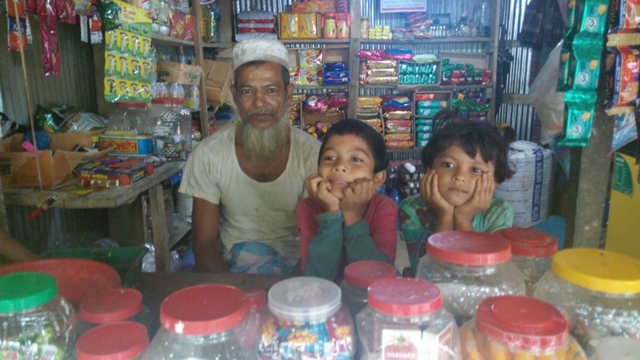FT Online
Published:2019-08-06 21:23:36 BdST
Two years into Rohingya influx: Host community’s woes worsen further
Nurul Hossain, the lone breadwinner of a 10-member family in Teknaf upazila of Cox’s Bazar district, has been in dire straits trying to make ends meet ever since losing his cultivable land due to the influx of Rohingyas into his locality from neighbouring Myanmar.
Hossain, in his mid-50s, had to give away 60 decimals of land inside Unchiprang Rohingya camp under Whykong union though his family’s livelihood was largely dependent on the land alongside his earning as a day-labourer.
Hossain met a harsh reality as his income as a day-labourer also declined to less than half after the displaced Myanmar nationals took shelter in the district, forcing him to start a small grocery at Roykong village.
As his daily sale was only Tk 500-Tk 600, which was not enough to meet his family expenses, he sought donation from the International Committee of Red Cross (ICRC) to expand his business and ultimately received Tk 25,000 under its 'Micro Economic Initiatives (MEI)’ barely three months back.

With the money, Hossain bought a refrigerator on installments making the down payment of Tk 10,000 and invested the rest of the money in the shop. He also set up a small poultry farm borrowing money and now the daily sale of the shop is Tk 2,000-Tk 2,200.
Although there is a rise in his income, Hossain still faces difficulty in meeting the family needs. “We used to cultivate vegetables and crops on the land located inside the Rohingya camp. But we lost the land. Like me, other villagers are facing hardship after Rohingyas came here,” he said.
Abdul Bahadur, 32, a farmer of Roykhong village who is the sole earner of a six-member family, said he became almost unemployed as he lost 40 decimals of arable land due to Rohingya camp. “I used to earn Tk 1 lakh from the land which was leased from the Forest Department after every six months. But I’m now almost unemployed.”
Putu Barua, 45, another inhabitant of Roykhong who used to lead his livelihood catching crabs in the Naf River and making crab-catching tools (Chai), now found herself in great difficulty as they can hardly access the river following a restriction on movement in the bordering areas.

Now, he is dependent solely on making crab-trapping tools and had to take Tk 25,000 as donation from ICRC to boost his production.
Putu purchases a bamboo at Tk 450-Tk 500 to make 17-18 trapping tools (chai). He sells a chai at Tk 100-Tk 150 and earns upto Tk 350 a day but still faces difficulty to meet the family expenses.
Rahima Begum, 20, wife of a day-labourer Mohammad Hossain at Chakmarkul village under Whykong union, said the income of her husband sharply declined after the Rohingya influx.
Rahima, mother of two girls, used to do tailoring work occasionally to support her family. But now she has to do full-time tailoring work as the daily income of her husband declined to Tk 300 from Tk 700-Tk 800, which is not enough to meet the family needs.
The five-member family is now largely dependent on Rahima’s income earned from tailoring and she bought a new sewing machine taking donation from ICRC. Now Rahima can earn Tk 300-Tk 400 daily from the tailoring.
Like them, many local residents, particularly the poor ones, are still struggling to earn their livelihoods although two years have elapsed since the Rohingya exodus.
Additional Deputy Commissioner (Revenue) of Cox’s Bazar Mohammad Ashraful Afsar said the real income of local people has declined due to the hike in the prices of daily essentials.
He, however, said the administration is trying to raise their income in various ways.
Noting that some 150 non-government organisations are working for Rohingyas in Cox’s Bazar, he said at least 25 percent of all the funds allocated for Rohingyas will have to be kept aside for the local communities. “We’ve also asked the NGOs to give priority to local people in case of employment and ensure minimum wage of Tk 500-Tk 550 for a day-labourer,” he said.
The NGO Affairs Bureau on July 15 last issued a gazette notification asking all the NGOs, which would submit project proposals to assist the displaced Rohingyas, to allocate 25-30 percent of the funds for the local people.
Zafar Alam Chowdhury, former Teknaf upazila Awami League President, said the purchasing capacity of the poor people has declined as the prices of essential commodities have gone up following the influx of Rohingyas.
Head of ICRC’s Cox's Bazar office Sabrina Denuncq said the ICRC together with the Bangladesh Red Crescent Society (BDRCS) launched livelihood support activities in 2018 for the host families in the areas surrounding the camps to address the livelihood need of the most vulnerable families affected by the influx of displaced people from Myanmar in Teknaf.
She said ICRC has so far provided cash grants to the tune of Tk 37.2 million among a total of 1,326 families at Whykong and Nhila unions in Teknaf under its MEI project.
ICRC provides a Tk 25,000-Tk 30,000 donation to each family when they came up with income generating ideas, she added.
Sabrina Denuncq said the ICRC will also start vocational training programme soon to diversify the skills of the host communities.
Bangladesh is now hosting over 1.1 million Rohingyas and most of them entered the country after August 25, 2017 fleeing persecution in Myanmar.
Though Bangladesh and Myanmar signed a deal on November 23, 2017 over the repatriation of Rohingya, not a single Myanmar national has so far returned to their place of origin – Rakhine.
Unauthorized use or reproduction of The Finance Today content for commercial purposes is strictly prohibited.


